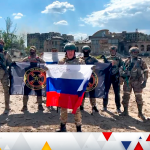“Everything I have in my life – my family – is missing,” Gaya Kalderon tells Sky News.
“I’m terrified from the photographs and can’t believe my eyes. It feels like a horror movie that would never come true. But it did.”
Gaya, who is 21, lives in Tel Aviv. Much of her family is in in Nir Oz, situated in the south of Israel.
Read more: Israel-Gaza latest: ‘800 Hamas targets’ struck in Gaza
On Saturday morning, Hamas swept into the village.
“I was terrified to wake up on Saturday morning and receive messages like ‘the terrorists are in my bedroom’ and my 16-year-old sister writing me: ‘I’m so scared.'”
Her father Offer, her sixteen-year-old sister, Sahar, and her brother, Erez, 10, were abducted from their homes by Hamas.
“I don’t know what happened to my father that raised me or my young siblings that I tried to protect my whole lIfe. And now I can’t do anything.”
Israel is reeling from the attack.
Beyond the immediate suffering, it is a huge psychological shock, both in terms of the people taken captive and the death toll.
Consider casualties alone.
This chart shows the number of Israeli casualties over the years, compiled by the UN.
The latest official figure of hundreds of deaths as of Sunday afternoon is more than every year since 2008 put together.
The number of Palestinian casualties over the same period is consistently much higher.
But the Israeli death count over the last few days is something that the nation has simply not seen before.
It is the upending of a world-view, something that will inform the Israeli response over the days to come.
So too will the hostage taking – a violation of international humanitarian law – by Hamas.
Sky News has been verifying videos of abductions.
Read more:
Briton killed in Hamas attack while serving in Israeli army
Explainer: What is Hamas, why is it in conflict with the Israelis?
They show similar tactics: gunmen going house to house in villages, searching for civilians. In some, they use power drills to take doors off the frames.
Once they have their captives, they speed away across the desert – presumably to Gaza.
These are snatch and grab raids against a civilian population.
Noa Argamani is a 25-year-old student who was attending a music festival near Re’im, also in the south.
Please use Chrome browser for a more accessible video player
Footage from the festival just hours before shows people dancing into the night. Then the attackers came.
A video shows Noa being bundled onto a motorbike – a friend of Noa confirmed to Sky News that it is her on the bike.
She reaches out beseeching hands to a companion, also being led away, and says to her captors: “Please don’t kill me.”
‘I couldn’t offer her a hand’
A subsequent video appears to show her sat down, drinking water. We don’t know where.
Her father, Yakov Argamani, spoke afterwards.
“What can I say? All my life, since she was born, I tried to protect her, and hug her, and support her, and love her,” he said.
“And here at this difficult moment, even to cheer her up, I couldn’t offer her a hand.”
As with the number of dead, the captive Israelis has double significance.
The first is tactical. What does it mean for any military operation in Gaza, from airstrikes to potential troops on the ground?
How are they to be rescued, or are they to be swapped for Hamas prisoners.
Be the first to get Breaking News
Install the Sky News app for free
But the second is again psychological: the pain caused to family members taken, the idea that no Israeli going about their normal life is really safe.
All of that will be part of Israel’s ongoing response.
As Gaya tells Sky News: “I just want my family back and wish my country will bring them back home.”






















